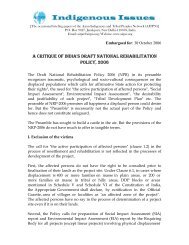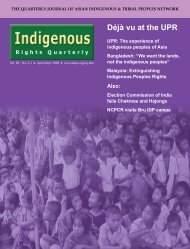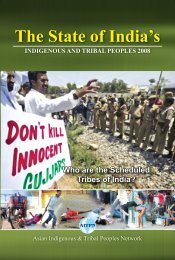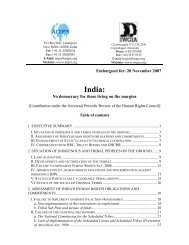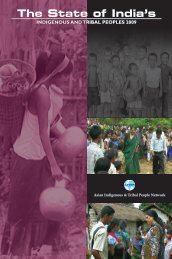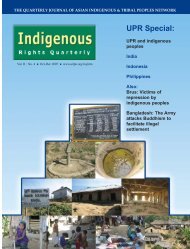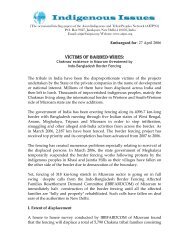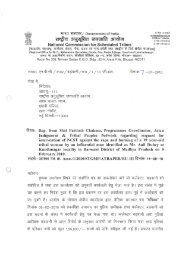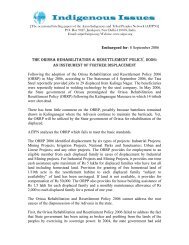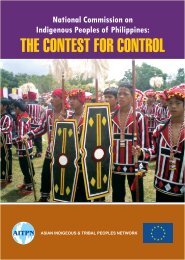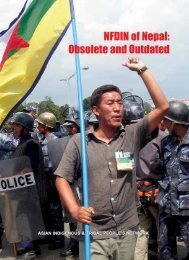india's forest rights act of 2006 - Asian Indigenous and Tribal ...
india's forest rights act of 2006 - Asian Indigenous and Tribal ...
india's forest rights act of 2006 - Asian Indigenous and Tribal ...
- No tags were found...
You also want an ePaper? Increase the reach of your titles
YUMPU automatically turns print PDFs into web optimized ePapers that Google loves.
INDIA'S FOREST RIGHTS ACT OF <strong>2006</strong>:Illusion or solution?5There were 2,57,226 <strong>forest</strong> cases pending against 1,62,692 tribals between 1953to 30 June 2004 under Sections 26, 33 <strong>and</strong> 41 <strong>of</strong> the Indian Forest Act 1927pertaining primarily to illegal felling <strong>of</strong> trees for domestic use <strong>and</strong> ferrying <strong>of</strong>wood by bullock carts in Chhattisgarh as on 8 November 2005,[2] <strong>and</strong> 2,531such cases in Orissa as on 10 March 2005.[3]The bias <strong>of</strong> the police <strong>and</strong> the <strong>forest</strong> department against the tribals is wellknown.In Jharkh<strong>and</strong>, a criminal case was registered against 4 minor tribalboys <strong>of</strong> Matrukha village in Giridih district <strong>of</strong> Jharkh<strong>and</strong>. The minors havebeen accused <strong>of</strong> destroying over 541 plants in the Purnanagar <strong>forest</strong>ation areaby bringing their cattle to the <strong>forest</strong> area for grazing. When the FirstInformation Report was registered on 18 September 2002, one <strong>of</strong> the accusedSone Lal, son <strong>of</strong> Gushaw Kishku <strong>of</strong> Matrukha village was just over 14 monthsold. On 18 December <strong>2006</strong>, the minor boy, along with his father, appearedbefore the court <strong>of</strong> Judicial Magistrate A.K. P<strong>and</strong>ey applied for bail <strong>and</strong> filed adischarge petition. By the end <strong>of</strong> the <strong>2006</strong>, the case was pending.[4]The Scheduled Tribes (Recognition <strong>of</strong> Forest Rights) Bill, 2005 re-christened as“The Scheduled Tribes <strong>and</strong> Other Traditional Forest Dwellers (Recognition <strong>of</strong>Forest Rights) Act, <strong>2006</strong>” was brought essentially to circumvent the SupremeCourt's order in the case <strong>of</strong> Godavarman Thirumalpad vs Union <strong>of</strong> Indiawhich banned regularization <strong>of</strong> tribal revenue villages. When the government<strong>of</strong> India passed the Forest Conservation Act on the mid-night <strong>of</strong> 25 October1980, hundreds <strong>of</strong> thous<strong>and</strong>s <strong>of</strong> indigenous/tribal peoples became illegalresidents on l<strong>and</strong> over which they have been living for generals. Yet,thous<strong>and</strong>s <strong>of</strong> others also had legal <strong>rights</strong> under the Forest Conservation Act.For two <strong>and</strong> half decades, the state governments failed to record <strong>and</strong>recognize even limited those ancestral <strong>rights</strong> <strong>of</strong> tribal communities permittedby the Forest Conservation Act <strong>and</strong> the subsequent 1990 Guidelines issued bythe Ministry <strong>of</strong> Environment <strong>and</strong> Forest. After the Supreme Court stayed theregularisation <strong>of</strong> revenue villages on 23 November 2001 in the aftermath <strong>of</strong>Godavarman Thirumalpad vs Union <strong>of</strong> India, all the tribals living in the <strong>forest</strong>irrespective <strong>of</strong> whether their <strong>rights</strong> were recognize under the 1980 ForestConservation Act or nor were effectively extinguished.The government essentially sought to address the denial <strong>of</strong> <strong>rights</strong> to thetribals. “The Scheduled Tribes <strong>and</strong> Other Traditional Forest Dwellers(Recognition <strong>of</strong> Forest Rights) Act, <strong>2006</strong>” did not address the concerns <strong>of</strong> the<strong>Indigenous</strong> Issues – The Occasional Briefing Papers <strong>of</strong> AITPN



